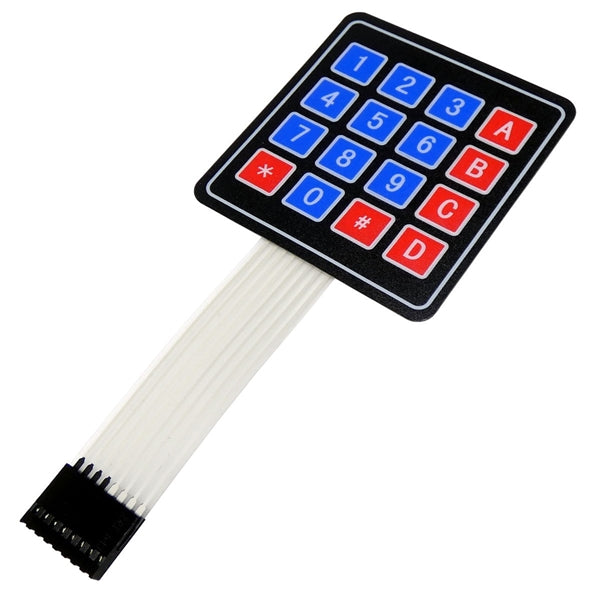The Importance of Membrane Switches in Building Intuitive Interfaces
The Importance of Membrane Switches in Building Intuitive Interfaces
Blog Article
Why Membrane Layer Switches Over Are Essential for Durable Control Systems
Membrane buttons play an essential duty in making certain the resilience and dependability of control systems across different markets. Their special building and construction permits them to sustain tough ecological variables such as moisture, temperature level extremes, and physical wear. This strength not just expands the life-span of the systems they offer yet additionally decreases upkeep demands. As we discover the diverse benefits of membrane switches, it becomes apparent that their relevance goes beyond mere functionality, affecting individual experience and functional performance. What more effects do these attributes hold for the future of control system style?
Review of Membrane Buttons
Membrane buttons are flexible and dependable parts typically made use of in different digital control systems. These switches include several layers, consisting of a graphic overlay, a spacer layer, and a published circuit layer. The graphic overlay supplies both functional and aesthetic layout, while the spacer layer guarantees that the buttons are turned on only when pressed. The published circuit layer consists of conductive traces that complete an electrical circuit when the membrane is pushed, allowing the device to reply to customer inputs.
Membrane layer buttons are commonly favored in applications needing a compact and lightweight layout, making them suitable for portable devices, medical equipment, and industrial machinery. They can be customized to fulfill particular individual requirements and can include numerous functions such as backlighting, responsive feedback, and several colors. Membrane buttons are resistant to dirt, moisture, and pollutants, making them ideal for settings where durability is necessary.
Benefits of Toughness
In numerous applications, the durability of membrane changes deals significant advantages that enhance their total efficiency and integrity. These switches are designed to stand up to harsh atmospheres, making them ideal for use in demanding conditions such as high moisture, severe temperatures, and exposure to chemicals. Their robust building aids to avoid damages from physical impact, ensuring resilient capability and lessening the need for regular replacements.
Furthermore, membrane switches are resistant to damage, which is vital in applications where frequent communication occurs. This toughness converts to reduce maintenance expenses, as organizations gain from lowered downtime and fewer solution disturbances. Additionally, the encapsulated layout of membrane switches secures internal parts from dust and dampness ingress, further adding to their life expectancy.
An additional benefit is their capability to maintain constant performance gradually. With a high resistance for mechanical tension, these buttons maintain their responsive responses and electric honesty, ensuring user complete satisfaction. Ultimately, the longevity of membrane layer switches not only boosts operational performance but additionally promotes confidence in their dependability, making them a recommended selection for control systems throughout numerous industries.
Applications in Different Industries
Durable control systems utilizing membrane layer buttons locate substantial applications across a series of sectors, each benefiting from the special attributes these buttons offer. In the medical market, membrane layer buttons are vital for tools such as individual displays and analysis devices, where integrity and ease of cleaning are paramount. Their resistance to moisture and contaminants ensures they preserve functionality in sterile environments.
The vehicle sector leverages membrane layer buttons for control panel controls and infomercial systems, where they give streamlined, inconspicuous user interfaces that boost customer experience. These buttons are additionally designed to withstand rough conditions, including direct exposure to severe temperatures and vibrations.
In industrial setups, membrane layer switches are frequently utilized in machinery control board, using tactile feedback and longevity essential for high-usage applications. Their capacity to stand up to chemicals makes them appropriate for manufacturing settings where spills and contaminants are frequent.

Customer electronics, such why not try these out as kitchen home appliances and remote controls, also use membrane switches for their adaptability and cost-effectiveness. Overall, the flexibility and robust nature of membrane layer switches over make them vital throughout numerous industries, ensuring effective procedure and durability in control systems.
Layout and Aesthetic Allure
While performance is paramount, the style and visual allure of control systems furnished with membrane layer buttons play an essential role in individual engagement and overall experience (membrane switch). The aesthetic layout of these switches can significantly affect individual perception and interaction. A well-designed membrane button enhances the beauty of the device, making it a lot more enticing to about his users and fostering a connection in between the customer and the product
Membrane layer switches over offer a lot of adaptability in style, permitting producers to customize graphics, shades, and textures to line up with brand name identification and item aesthetics. Using vibrant shades and unique patterns can draw focus, while responsive comments can strengthen the individual's communication with the gadget. In addition, the capacity to integrate LED signs and backlighting right into the membrane switch style gives both functional and visual advantages, boosting exposure and use in various settings.

Enhancing User Experience

Furthermore, membrane buttons can be tailored to include visual interfaces, improving usability by presenting information in a clear and instinctive fashion (membrane switch). This customization can include icons, tags, and shade coding that overview customers through complicated capabilities effortlessly. Furthermore, their flexibility permits assimilation in numerous environments, guaranteeing regular efficiency whether in industrial machinery or consumer electronics
The resilience of membrane buttons also plays a vital role in individual experience. By holding up against extreme conditions and extended usage, these switches lower the probability of system failures, therefore promoting dependability and user self-confidence. Inevitably, the calculated use of membrane layer switches over not just raises performance but also substantially improves customer interaction with control systems, making them a vital component in modern style.
Verdict

Report this page